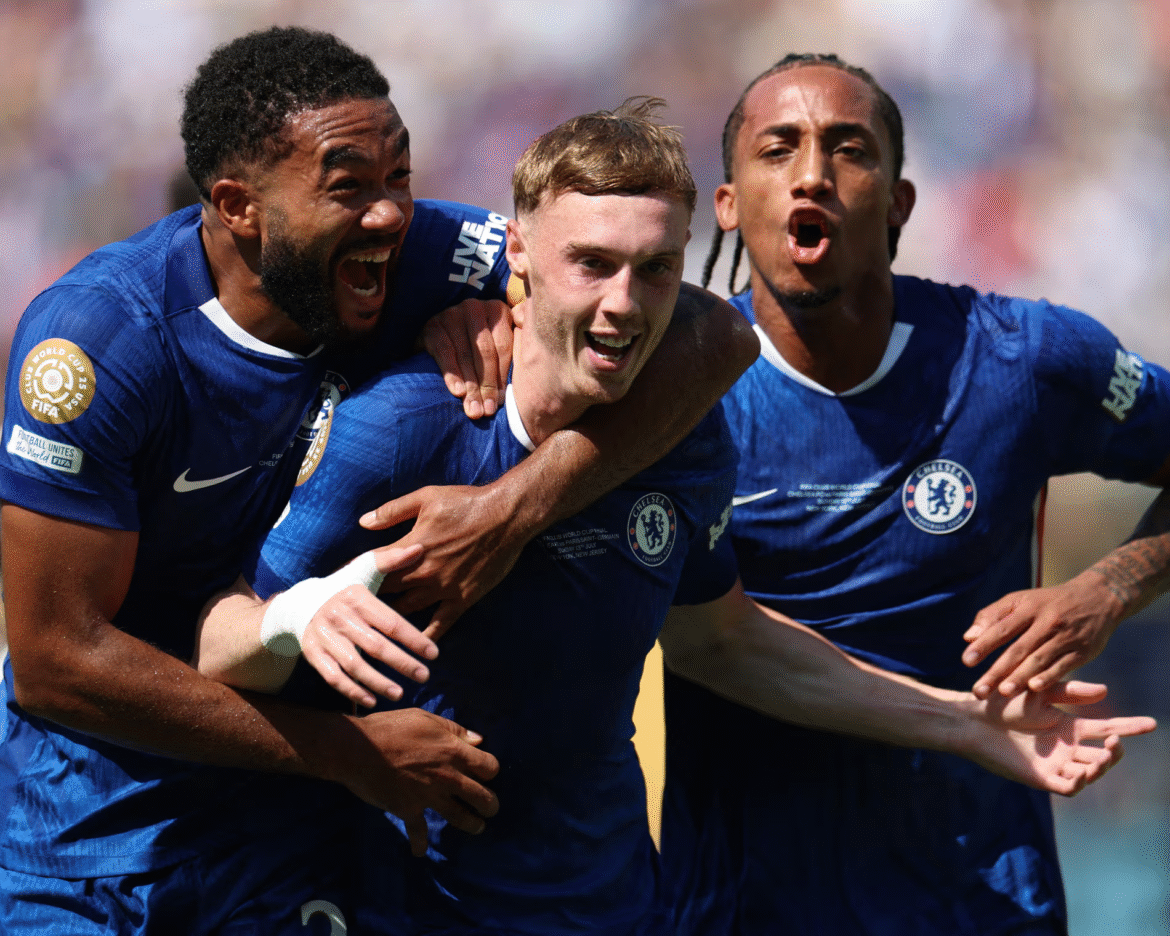On July 13, 2025, Chelsea crowned their remarkable resurgence by defeating Paris Saint‑Germain (PSG) 3–0 in the 2025 FIFA Club World Cup final, held at MetLife Stadium in New Jersey. Despite PSG entering the match as lofty favourites and having stormed to the Champions League trophy earlier in the season, Chelsea under manager Enzo Maresca overpowered their opponents with tactical precision, ferocious pressing and attacking cohesion
Chelsea opened the scoring in the 22nd minute, with Cole Palmer showcasing poise and creativity. Initiated by a long ball from goalkeeper Robert Sánchez, Malo Gusto brought the ball forward before laying it off to Palmer, who cut inside and coolly finished into the bottom corner. It was the beginning of a masterclass by the rising English talent.
Just eight minutes later—around the 30th minute—Palmer struck again. The move started with Sánchez launching play from the back. Gusto outmuscled Nuno Mendes to win possession and find Palmer in space, who repeated a similar finish to his opener with calm precision, emphatically doubling Chelsea’s lead .
Chelsea wrapped up a clinical first half in the 43rd minute when João Pedro, largely unmarked behind PSG’s defence, remained alert to Palmer’s cutback pass and lobbed the ball over Gianluigi Donnarumma. The scorched-earth efficiency of the Blues left PSG in tatters at the interval, staring at a massive deficit.
Tactical Explosion and Dominance
Maresca’s game plan was bold: intense pressing from the front, midfield supremacy, and fast transitions. Chelsea suffocated PSG’s rhythm. Moisés Caicedo, Enzo Fernández, and Reece James controlled the centre of the pitch, curbing PSG’s creative outlets and forcing errors. Fernández not only assisted but also finished the tournament with more assists (3) than anyone else—a testament to Chelsea’s well-balanced squad depth.
PSG, led by Luis Enrique, had been dominant en route to the final—including a stunning 4–0 hammering of Real Madrid in the semifinals. They arrived in New Jersey with 16 goals scored in the Club World Cup, tied for most in tournament history. Yet none of that momentum translated onto the big stage, as Chelsea’s intensity neutralised stars like Kylian Mbappé, Ousmane Dembélé, and Bradley Barcola.
Turning Point and Red Card
PSG’s frustrations boiled over late in the match. In the 87th minute, midfielder João Neves was shown a straight red card for violent conduct, sealing PSG’s downfall and symbolizing the mental collapse from Chelsea’s ceaseless pressure.
Meanwhile, Chelsea’s keeper, Robert Sánchez, played a pivotal role between the posts with several key saves, ensuring PSG’s faint second-half threats never materialised.
Greater Significance: A New Elite Chapter
This victory encapsulated a historic turnaround for Chelsea. Under owner Todd Boehly’s stewardship and Maresca’s management, the club has turned recent criticism of overspending into tangible success. It’s their first Club World Cup title, doubling up on their earlier Conference League triumph—making them the first club to win all four major European trophies .
PSG, despite their wealth and dominance in Europe, were reduced to spectators. Critics had questioned whether PSG’s star-studded roster and enormous investment—reportedly €2.283 billion since 2011—contributed to consistent results or merely hollow spectacle.Their UEFA Champions League title earlier in the season was also labelled by some as sportswashing, underlying the scrutiny that surrounds state-backed clubs.
By contrast, Chelsea’s London-based rebuild feels more grounded: youth integration, strategic recruitment, and a team ethos that combined grit with flair. Palmer’s breakout and Fernández’s creative control showcased a forward-moving blueprint for success .
Legacy of the Final
Chelsea’s clean-sheet, one-sided victory rewrote recent football narratives: PSG were outclassed tactically and physically. All three goals came before half-time—a feat that PSG had never experienced—and the Blues’ defensive solidity kept xG conceded in the first half under 0.85, the lowest in the tournament .
This emphatic final also adds another dramatic chapter to the rivalry between Chelsea and PSG. Their previous eight meetings in Europe had been tight affairs: Chelsea had won twice, PSG had three wins, and three ended in draws, most notably the dramatic 2014–15 Champions League round-of-16 tie decided by away goals after a red card to Ibrahimović and late goals from David Luiz and Thiago Silva for PSG.. But this final heralds a new dynamic—Chelsea now stands tall on the world stage.
Final Thoughts
In New Jersey on July 13, Chelsea delivered a defining performance. Cole Palmer emerged as the hero, João Pedro as opportunistic finisher, and Enzo Fernández as midfield architect. Under Enzo Maresca, Chelsea’s tactical order, collective intensity, and disciplined execution dismantled one of Europe’s most expensive and accomplished squads.
PSG, favorites just days earlier, went down as beaten favourites, their Champions League form rendered irrelevant. For Chelsea, this wasn’t just a trophy—it was vindication of a project and statement of future ambition. As the football world watches, this victory signals Britain’s resurgence in world club football—and Chelsea’s arrival at the very top.
